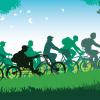
Florian Hofhansl reports on the IIASA Social and Cultural Association (SOCU)’s participation in the 2022 edition of the Lower Austria cycling initiative – Niederösterreich radelt.
2022 was a year of multiple records for the Lower Austria cycling initiative with the number of participants rising by 25% to 5,430 compared to the previous year. The number of kilometers cycled increased by 27% to 4,180,090 kilometers, which amounts to around 100 trips around the world, while the number of participating communities increased by 45% to 185. Through this initiative, the people of Lower Austria have saved around 737 tons of CO2 by using their bicycles instead of other methods of transport. This is equivalent to around 375,000 average journeys by car.
The popular annual kilometer by bike collection campaign took place for the fourth time this year. Registered participants could document the kilometers cycled for the state of Lower Austria from 20 March to 30 September as representatives of either their hometown, their employer, or a club, to win many prizes. This year, the main prize was an e-bike and a holiday voucher worth 500 euros, which was distributed among participants who had cycled at least 100 kilometers. IIASA staff contributed 7,913.3 km to the 2022 campaign and SOCU secured 3rd place in the category for clubs with 200 to 1,000 members (Vereine mit 200 bis 1.000 Mitgliedern). In this regard, I was privileged to attend the initiative’s award ceremony, which took place on 16 November 2022 in Burg Perchtoldsdorf as a representative of IIASA, and specifically SOCU, to receive a certificate acknowledging the institute’s participation in the event.
 © Radland
© Radland
Florian Hofhansl (second from the right) with other participants receiving prizes for participating in the 2022 bike to work campaign.
Despite the fact that winners received trophies and certificates as a reward for the kilometers they cycled, the initiative is not about speed or top athletic performance, but rather about motivating people to cycle in everyday life, which also has benefits for the environment, as choice of personal mobility may affect about 10-15% of the carbon footprint from transport. Although this climate benefit of riding a bike might be negligible, it can be one more step on a path to a low-carbon lifestyle.
 © Florian Hofhansl
© Florian Hofhansl
Sometimes things don't go as planned - unexpected detour on trans-European bike route 9A.
I for one, enjoy trading my e-car commute for a refreshing morning bike ride once in a while – even if it sometimes comes with unexpected challenges due to the fact that local authorities might not pay attention to commuters’ needs – even on trans-European bike routes, such as Eurovelo 9A. Nonetheless, most of my commutes are worth the effort and thus my hope is that others might be inspired to join the movement and change their behavior when commuting to work, for which I have contributed more than 5,000 km on less than 100 active days of cycling.
In fact, this was not the first appearance of IIASA in the Austrian Bike to Work month, as in 2016 the institute ranked 5th in Austria and even 1st place in Lower Austria (see this blog post). Hence, my plea would be that if we all work together and contribute as much mileage as possible, IIASA might once again win the 2023 campaign!
For further information and a picture of the 2016 winning IIASA team please see: https://radkompetenz.at/en/1976/new-record-at-the-austria-cycles-to-work-campaign/
Note: This article gives the views of the author, and not the position of the Nexus blog, nor of the International Institute for Applied Systems Analysis.